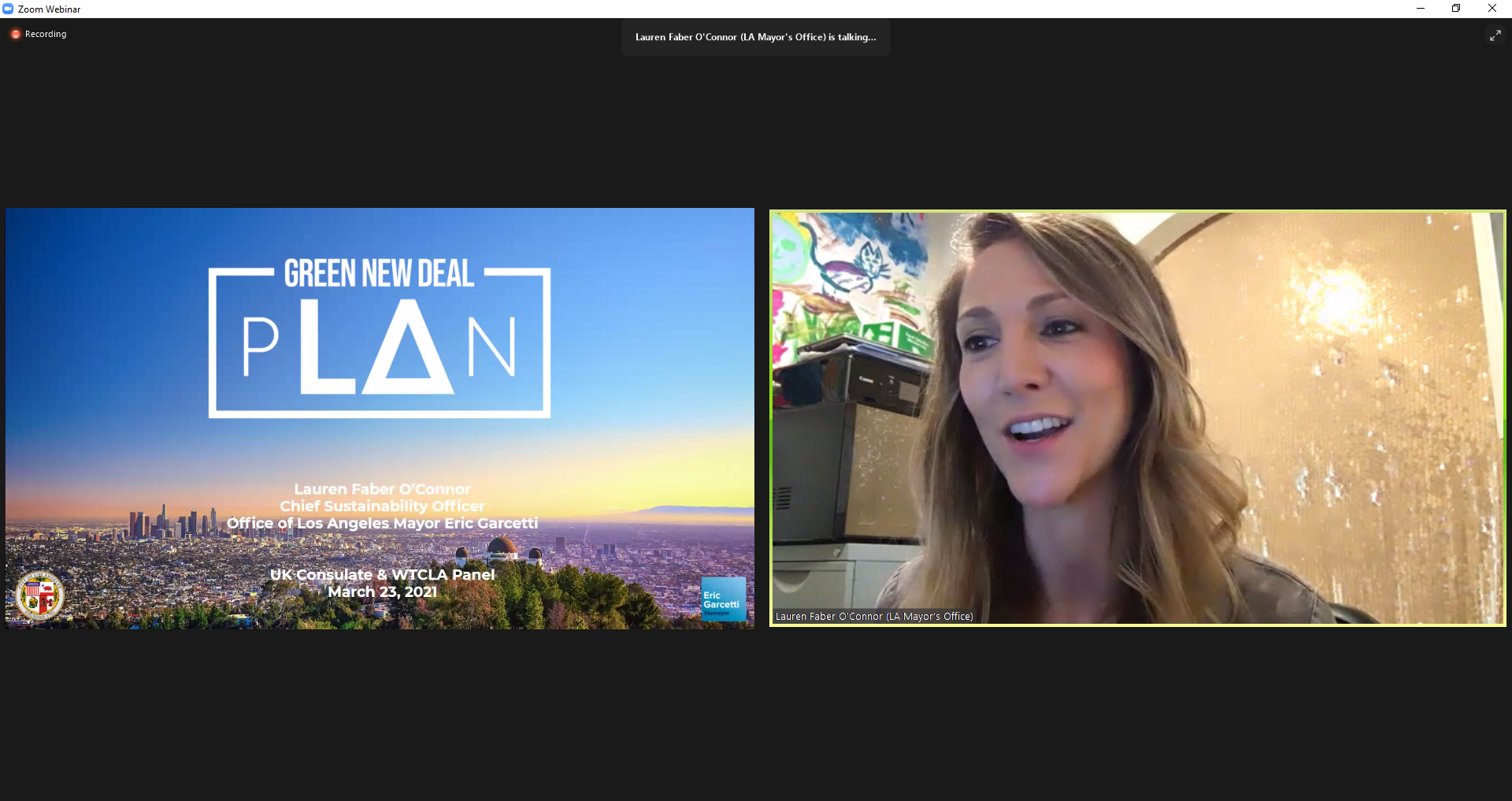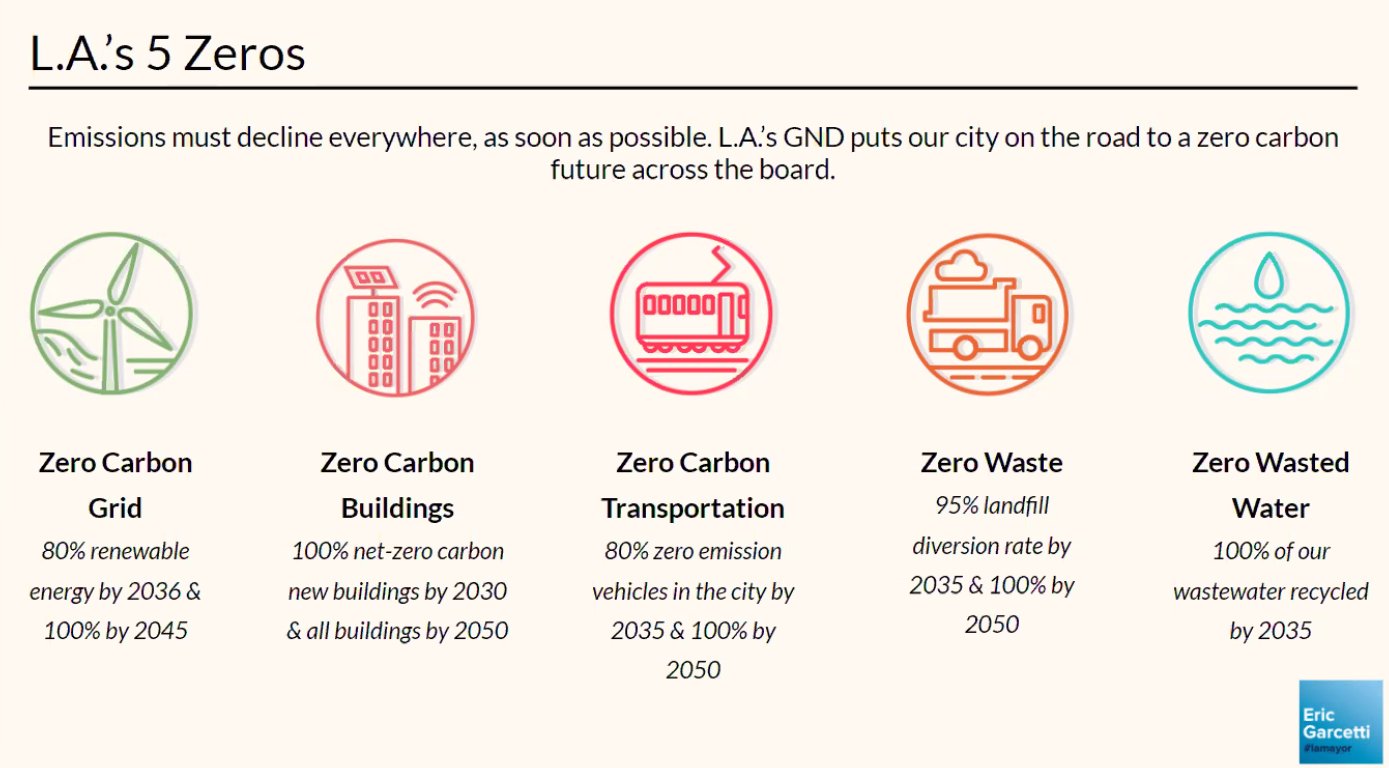As California sees federal support for sustainability, and the UK looks to California fresh from Brexit, both see opportunity in global collaboration on climate investment and innovation.
“Study after study has shown that these climate solutions are really better drivers of economic growth and jobs than reinvestment in business-as-usual, and that’s without even counting the benefits to climate, health and society… so recovery plans should be green and climate-aligned… And those companies and countries that choose to pursue a climate-aligned path will be best positioned to reap the benefits.”
– Jennifer Austin
On March 23, 2021, World Trade Center Los Angeles (WTCLA) and LAEDC hosted a virtual event with diplomatic leaders from the newly independent United Kingdom (UK) to discuss, Leading a Sustainable Economic Future: The United Kingdom and Los Angeles.
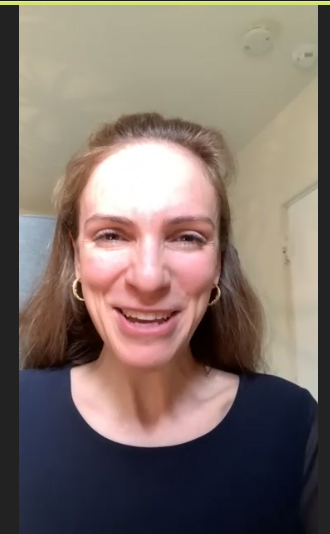
Emily Cloke, Consul General of the UK in Los Angeles
Emily Cloke, Consul General of the UK in Los Angeles started by expressing excitement about partnering with Los Angeles and California on sustainability. The UK is the second largest investor in Southern California and greater partnership can create more jobs, especially in this growing sector. “We are totally aligned on climate,” she said, and mentioned the ZEV transportation targets set by State of California. The UK government prioritizes investment in the green economy, and Cloke sees California as the leader in driving US climate ambitions, and thus a UK partnership with LA makes sense to drive greater progress.
Cloke cited City of LA’s leadership with its Green New Deal as an area where the UK consulate can support collaboration with local LA interests, and mentioned the key areas of cutting water use, public chargers, leading in renewable energy, zero emissions transportation, and electric car sharing in disadvantaged neighborhoods. She recognized Mayor Garcetti’s role as a global leader in that regard, including as chair of C40 Cities, a global collaboration of mayors taking action on climate.
Cloke said that the UK cohosting COP 26 in November, and the UK’s G7 presidency will both be vehicles to advance the climate agenda and harness the strength of G7 to push for cleaner air, healthier communities, sustainable economic growth, energy security and a stable climate.
The UK has partnered with the CoMotion LA event and initiatives, and in fact a UK company named Zeti won the start-up competition for its disruptive zero-emissions cargo vehicle financing for fleets, using a pay-as-you drive system. Cloke suggested that the UK’s ambitions for financing green investment in the private sector will hopefully provide opportunity for LA, and she wants to work closely with local organizations on that subject.
Lauren Faber, Chief Sustainability Officer in Mayor Garcetti’s Office of Sustainability, talked about the LA Green New Deal and how her office is working with the private sector to achieve goals with a heightened sense of urgency as the climate crisis becomes increasingly visible. “We are truly in a race against time, and that motivates us and the mayor.”
The LA Green New Deal prioritizes equity, a green economy that welcomes people from all over the world and works for LA’s workforce. “The five zeros are our key north-star goals” (see image) and include energy, water, waste, transportation, housing, resilience, healthy food, urban ecosystems and eliminating carbon wherever possible and feasible – all these pieces interact with each other.
She talked about the City’s investment in green hydrogen as part of LA100 – a three year study to get LADWP to 100% renewable. “Its not just buying green power, because we own and operate generation, transmission, distribution, delivery. We run the grid.” In other municipalities, CAISO manages much of the grid, so LA has more ways in which to take action.
Faber said, “One finding is that 100% renewable energy is absolutely achievable,” with multiple, reliable, affordable pathways. An example of the City’s investment in green hydrogen is the Intermountain power plant, which is being switched from coal. It had been planned to convert to a natural gas plant, but pivoted to green hydrogen which will be stored in underground salt caverns on site to use when other renewable generation is unavailable. The project is gaining national attention, and when it opens it will run on at least 33% green hydrogen.
 Faber also said that the City has partnered in the Climate Mayors EV Purchasing Collaborative to help cities afford ZEV fleets, and the portal harnesses the purchasing power of hundreds of cities and other agencies to buy vehicles. Over 245 public fleets are using this portal to buy upwards of 4,000 vehicles so far, including electric buses.
Faber also said that the City has partnered in the Climate Mayors EV Purchasing Collaborative to help cities afford ZEV fleets, and the portal harnesses the purchasing power of hundreds of cities and other agencies to buy vehicles. Over 245 public fleets are using this portal to buy upwards of 4,000 vehicles so far, including electric buses.
She also pointed to other resources, including CoMotion LA as a hub for zero emission transportation – intended to drive investment and jobs in green mobility. The City offers urban proving grounds, physical spaces where companies can test, to leverage investment. Regarding solar, the City’s Feed in Tariff offers favorable rates to encourage developers to build big projects to increase supply of renewables, with commercial properties engaged as a part of that solution.
Port of LA, operated by City of LA is moving to a zero-emission operation model. It requires international collaboration, and Mayor Garcetti is using C40 as a way to organize that, including a clean truck finance focus. Faber said they are exploring how we can scale up ZEV truck fleets in LA to service the port(s). She thanked Governor Newsom for supporting that goal with his executive order on ZEV trucks by 2035.
“Our recovery must be a green recovery…focused on equity and sustainability.”
Faber closed by noting LA’s special relationship with the UK, and agreed with Emily Cloke’s remark that we are partners, co-innovators and together we further common values and shared goals.
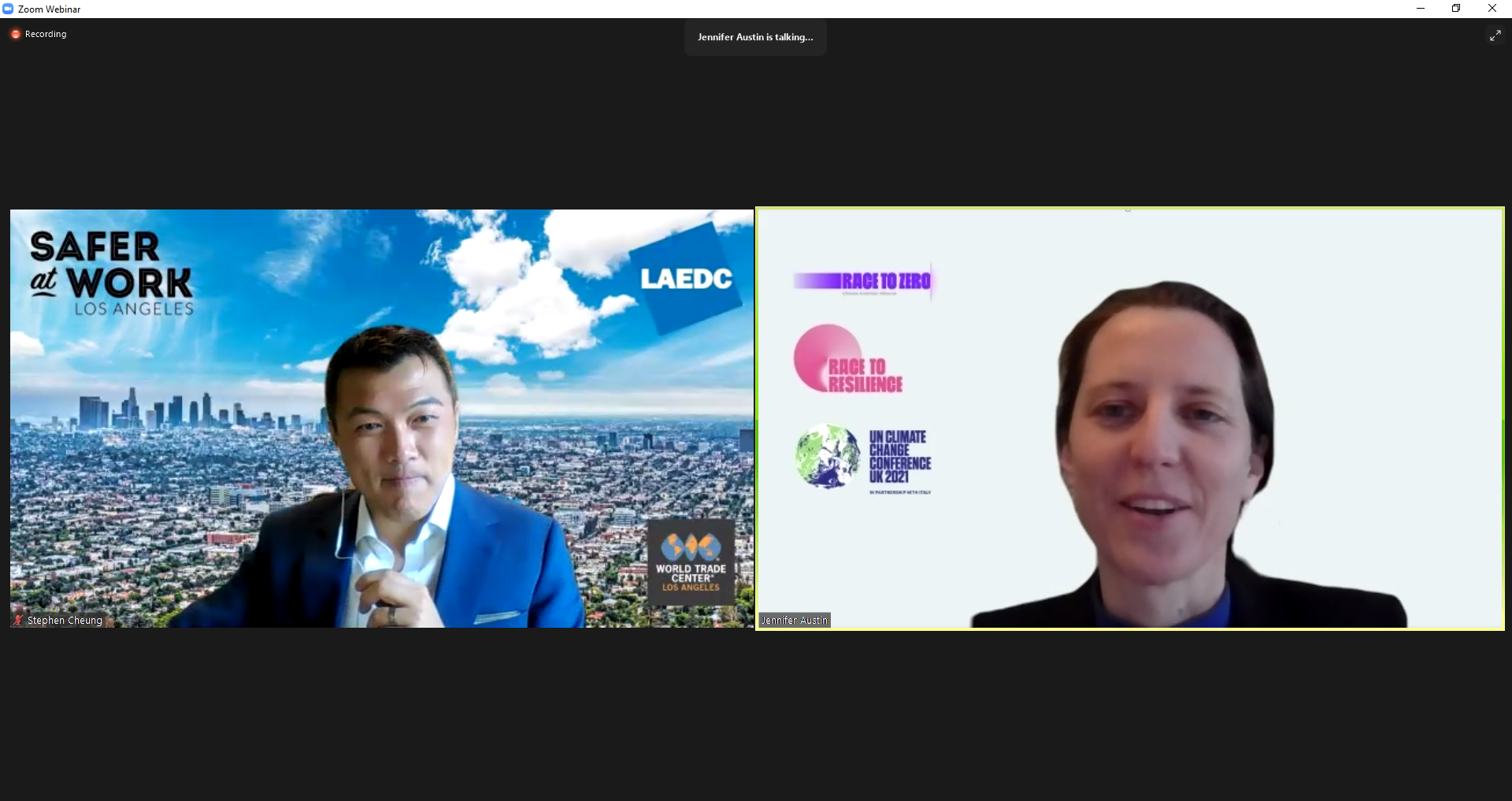
Jennifer Austin, Director of Strategy and Policy, COP High Level Champions for Climate Action, introduced by Stephen Cheung, president of WTCLA and COO of LAEDC
Jennifer Austin, Director of Strategy and Policy, COP High Level Champions for Climate Action, described her organization’s mandate from the UN to organize non-state actors – businesses, investors, cities – to bring together and channel non-state actors in the climate solutions conversation.
She said, “We clearly have a big year ahead of us,” referring to the political will to act, coupled with overshooting the 5-year deadline set in Paris, which would have been 2020, but was instead postponed. “It is a really critical decade for climate action,” to limit warming. She said, “we need to be concrete and specific” on each of our milestones to stay on course for zero by 2050.
Austin echoed Emily Cloke by emphasizing that the UK is presiding over G7 this year and will put climate at the top of the agenda.
She talked about Race to Zero a coalition of non-state actors that brings together leading net zero programs, setting interim targets, and harnessing all the city initiatives in the world, and exploring business opportunities as part of that.
Austin said that big global businesses are making commitments of all sorts and we want to validate and make sure it isn’t greenwashing. More and more entities are starting to realize we need to take climate action, although it can be complex in some sectors. But peers in the ecosystem are working through decarbonization challenges and by breaking down the way all the actors work together, recognizing that complex interdependence can create greater benefits. She said we are part of a growing cohort of peers that are taking action and trying to get unstuck when challenges arise.
She noted that green hydrogen can be a good shipping fuel. For example, Maersk has a net zero emissions commitment, and is planning to launch some ships on the water by 2030 and meet full compliance by 2050, and they will be able to achieve this first milestone within just a few years, beating their targets. They need supportive infrastructure at the ports, which represents opportunity.
She noted that our largest retailers are also making commitments to net zero, and they need to analyze all the five zeros and need to look at transportation, packaging, and a host of issues. System breakthroughs require a critical mass of actors to reach a real tipping point. “As we reach that, we will reach exponential rates of growth” in decarbonization. It will take off quite quickly, she says.
“Study after study has shown that these climate solutions are really set to be better drivers of economic growth and jobs than reinvestment in business-as-usual, and that’s without even counting the benefits to climate, health and society… so recovery plans should be green and climate-aligned… “And those companies and countries that choose to pursue a climate-aligned path will be best positioned to reap the benefits.” In other words, the export opportunities for those who develop the solutions will drive more jobs and a stronger economy.
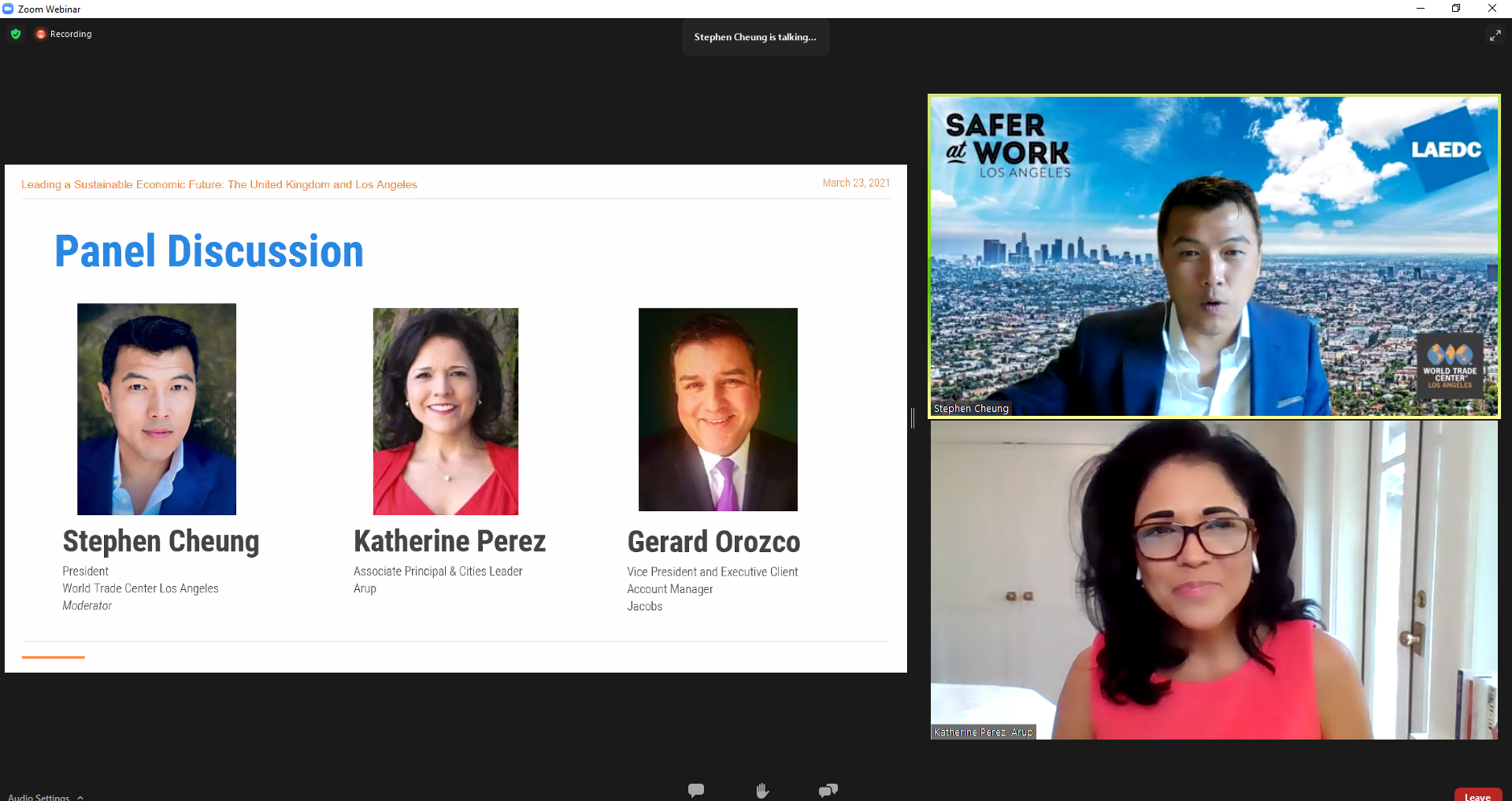
Stephen Cheung, WTCLA president and COO of LAEDC expanded on Austin’s remarks by saying LAEDC’s interest in sustainability is aligned with growth of jobs, which is a big focus. LA County lost 700,000+ jobs when COVID hit, and when we look at recovery, a private sector role in a sustainable future is vital. Stephen kicked off the panel discussion.
PANEL DISCUSSION
Katherine Perez, Cities Leader for ARUP, said the LA Green New Deal is pivotal. Private industry making decisions to commit and be transparent is difficult and it means a lot. It drives systems change. Taking the first step – using tools like the 17 metrics in the UNSDGS Goals to measure your efforts against goals – will serve as a guide. She encouraged the audience to consider procurement, subcontracts, how you buy materials or even food, and the daily practices of running your business.
Gerard Orosco, VP at Jacobs talked about the company’s recent work in sustainability. “We have been appointed by TfL task force London to analyze congestion charges to help deliver on a green recovery for London. Here in LA, Jacobs has been awarded the sustainability engineering contract for LA Metro, and works on waste management, waste reduction, recycling and diversion from landfills, and related zero waste goals in transportation.
Has COVID set us back?
Katherine: Inequities have been highlighted during the pandemic. Equity and resiliency go hand in hand; targeted investment in sustainability can make a difference neighborhood by neighborhood.
Lauren: The average person has a lot of worries about health, paychecks, open/closed economy, so it is harder to capture people’s attention the way we did a year ago. But in terms of the action and solutions to address health and economic impact from the pandemic, the solutions should accelerate climate action. This nexus of solving multiple problems at once is something all the cities should be doing. “We have to be really intentional about explaining that we can solve multiple problems at once, and frankly that is what people want their governments to do, and want business to do. Not say, hold on this one thing while we figure this other problem out.” Faber said that our recovery plan is the Green New Deal – stimulating jobs, protecting health, and solving multiple problems at once. We know where to put investments.
Gerard: The American Rescue Plan which was signed into law includes $100 million for the EPA to address disproportionate impacts of air pollution and other hazards on disadvantaged neighborhoods, so the money is there we just need to direct it to projects. That represents opportunity.
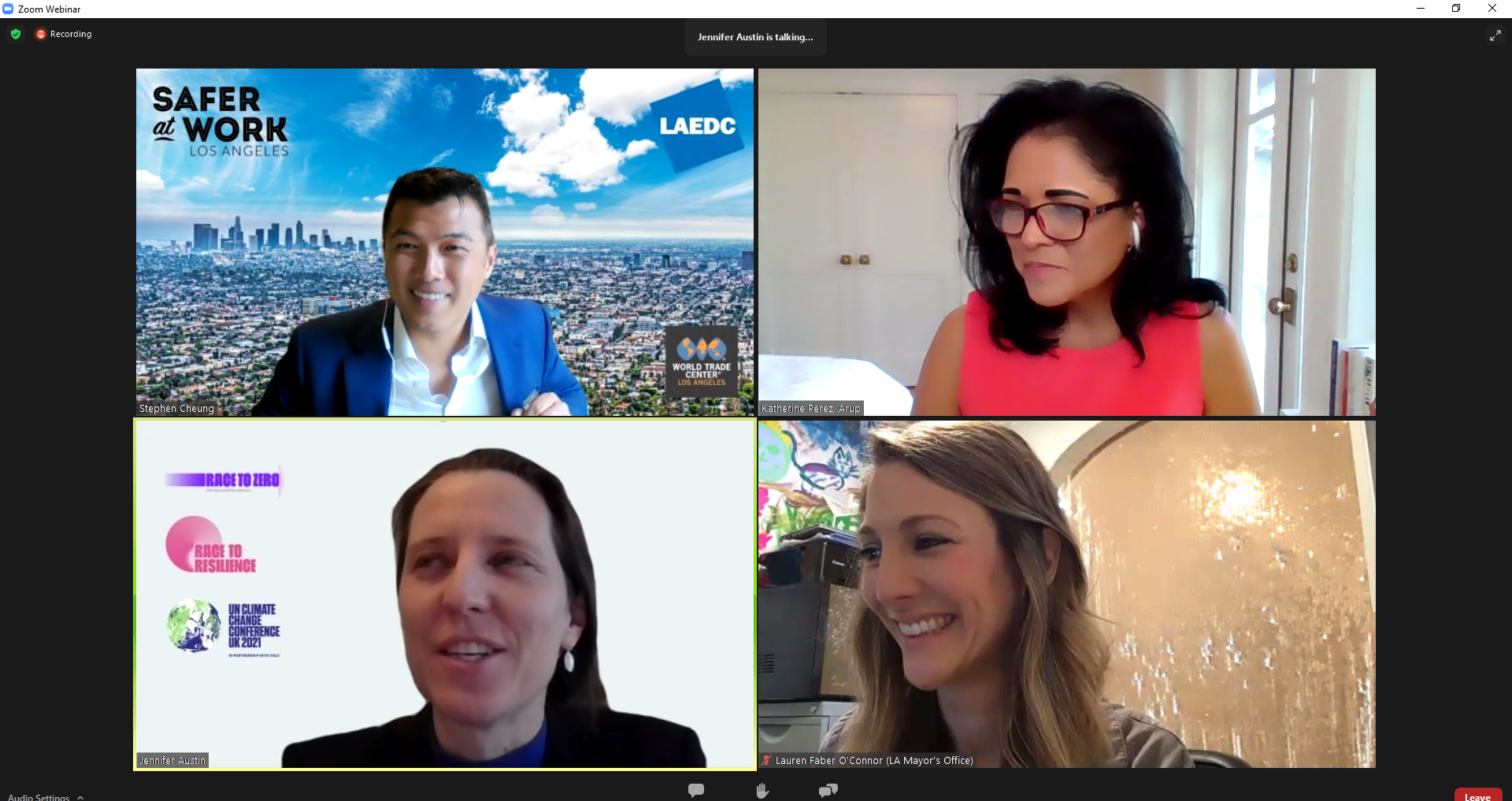
LA’s dual sea ports are seeing a rapid increase in traffic, and while both ports have committed to zero emissions by 2050, what are the obstacles?
Jennifer: “People tend to underestimate the pace of change and it’s happened to us every time,” she said, meaning it’s hard to imagine the future and how quickly it will arrive, so planning isn’t as future-forward and ambitious as it should be in almost every instance in history. “But we can and should update the way in which we make our plans and the level of ambition,” to recognize that change on climate solutions will be happening at an exponential rate.
Austin said the exponential growth phase and the real power of inertia are competing forces, but when everyone coordinates we see great progress on big global problems. “Public commitments are important. We need a real understanding of the investments that will be needed to get this exponential growth later.” If you recognize that the market will be there, it makes bold investment easier.
A barrier and pain point within the decision process, is that the low carbon things seem costly, e.g. steel or cement. Making low carbon steel requires much more investment, but studies show that building a city block with low carbon materials won’t be that much more expensive on the whole, even though the cost per unit of a bar of steel seems large. One particular transaction highlights an individual cost, but we need to recognize that policy can help that one pain point so it doesn’t get in the way of an ultimately better solution or decision.
Stephen Cheung closed by thanking the panelists and conjured up our imaginations about international travel again, including to COP 26.
—–
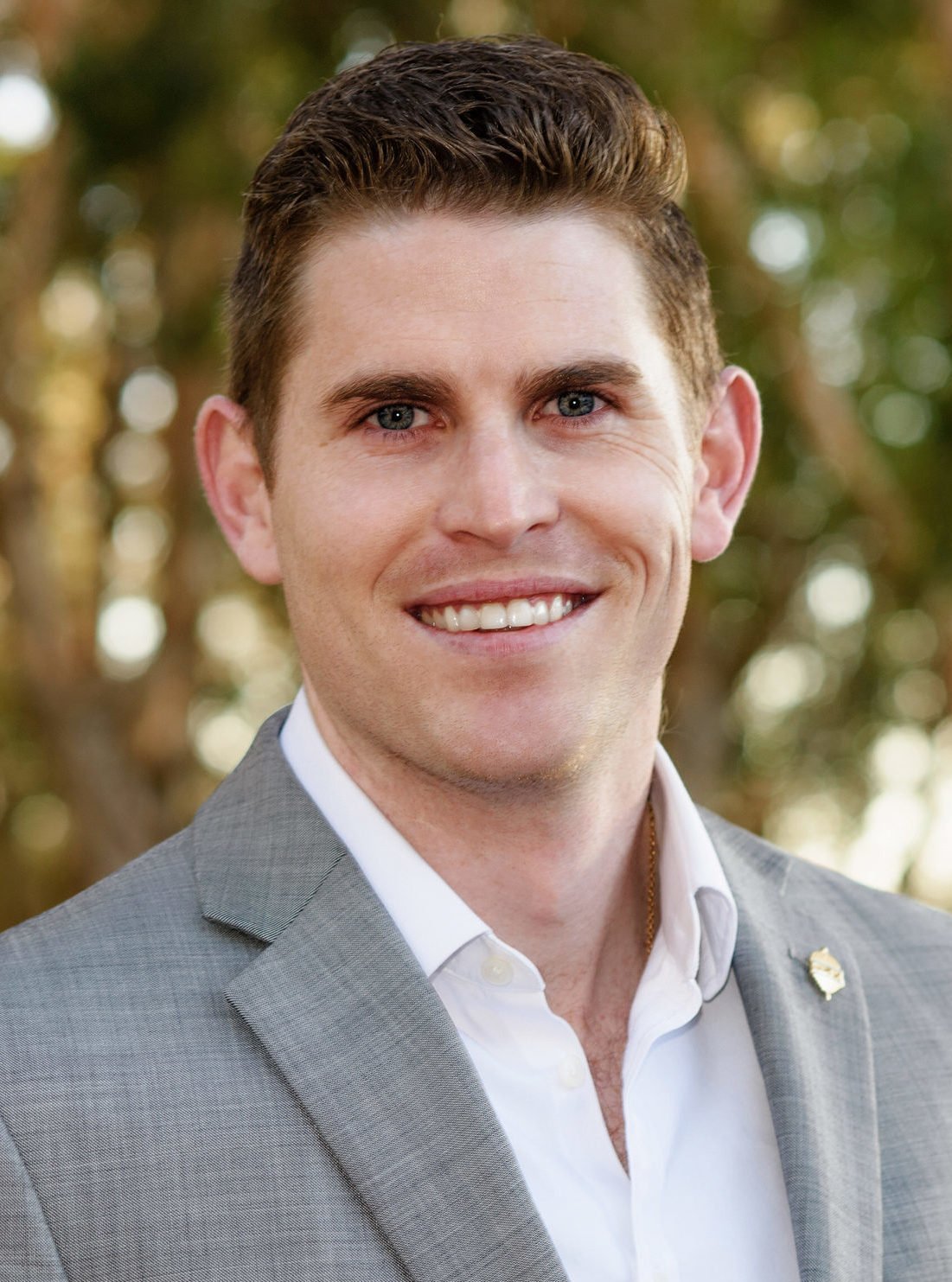 If you would like to collaborate with WTCLA’s work of attracting and facilitating international investment into Los Angeles County, and finding the partners and resources to make the most of those opportunities, please contact WTCLA International Trade Director Michael Smith at [email protected].
If you would like to collaborate with WTCLA’s work of attracting and facilitating international investment into Los Angeles County, and finding the partners and resources to make the most of those opportunities, please contact WTCLA International Trade Director Michael Smith at [email protected].
